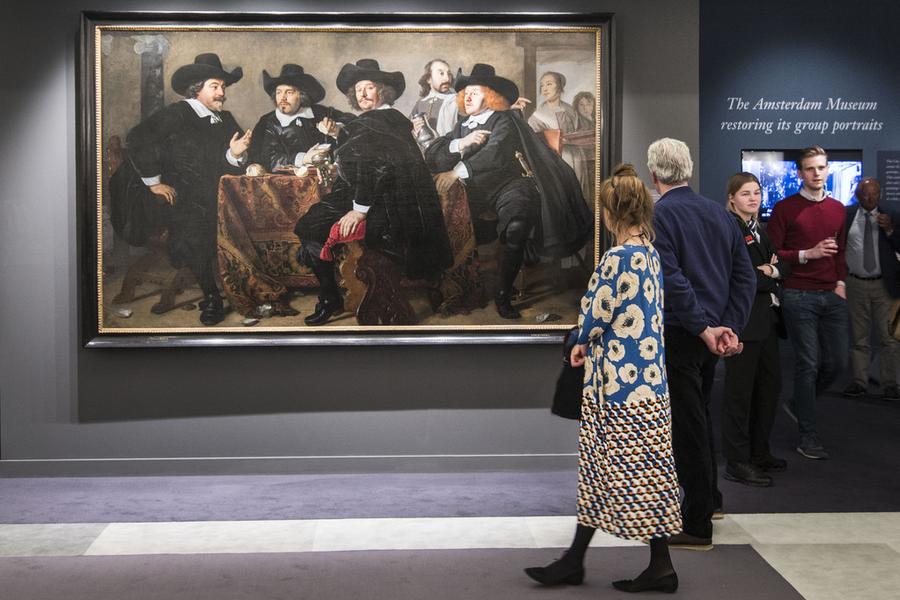Why I didn’t Visit the European Fine Art Fair (TEFAF) this Year

"I was a young adult when I visited TEFAF the first time. The 2020 edition could have been my 30th visit. For the first 20 years I visited TEFAF with my uncle, a smart man. He could determine the most expensive piece between 2 almost identical still life flowers from the old masters. I remember Mr Noortman’s booth at the entrance. Mr Noortman was always smoking a cigar. At Mr Loek Brons’ booth you could always grab a Dutch mint candy. The entrance was decorated with the most beautiful flower bouquets (I look differently at the flowers now). It was an impressive fair".
Image: Loan Exhibition from Amsterdam Museum, Photo: Loraine Bedews
I was a young adult when I visited TEFAF the first time. The 2020 edition could have been my 30th visit. For the first 20 years I visited TEFAF with my uncle, a smart man. He could determine the most expensive piece between 2 almost identical still life flowers from the old masters. I remember Mr Noortman’s booth at the entrance. Mr Noortman was always smoking a cigar. At Mr Loek Brons’ booth you could always grab a Dutch mint candy. The entrance was decorated with the most beautiful flower bouquets (I look differently at the flowers now). It was an impressive fair.

Loan Exhibition from Amsterdam Museum, Photo: Loraine Bedews
This year, for the first time in nearly 30 years I didn’t visit TEFAF.
This year TEFAF took place March 7- 15. It was common knowledge at that time that COVID-19 was having devastating consequences in Wuhan, China. It was also known that on February 21 there were already 47 registered COVID-19 cases in Europe. Knowing collectors, dealers and artists travel the highly globalized art world non-stop you didn’t have to be Einstein to understand TEFAF 2020 could have been a place where the chance of being contaminated was larger then average (TEFAF also understood, and in the end they closed the fair 4 days early). That’s why I didn’t visit TEFAF this year.
Yesterday The Art Newspaper reported that at least 25 positive cases of coronavirus (Covid-19) have emerged among exhibitors and visitors to this month’s TEFAF Maastricht fair in the Netherlands. The organisers of the fair, which attracted 28,500 visitors, are now facing sharp criticism for allowing a major international event of nearly 300 exhibitors to go ahead as the virus spread across Europe. The fair was shut four days early on 11 March after one exhibitor, an Italian Modern art dealer, tested positive for the virus on return to his home country. According to TEFAF participants who have spoken to The Art Newspaper, between 23 and 35 exhibitors and visitors may have contracted the virus at the event; some have since been hospitalised and a number are in intensive care. But the real number of those affected is likely to be much higher.
We asked TEFAF and the City of Maastricht for a reaction. They responded with the following:
“Hearing that the virus has reached some of us within our community is very upsetting and worries and saddens us, and we wish all a speedy recovery. We are of course in touch with many members of our tightknit TEFAF community directly. To isolate the coronavirus to only our fair, that happened right at a turning point when in The Netherlands and many other countries, such as the US, the virus quickly started to spread, is unfair. There were no cases in The Netherlands when we started the fair. At the start of the fair, a vast majority of our dealer community was expressing their gratitude to the Dutch health authorities for their guidelines, which at that point were perceived by almost the entire dealer community as “a down to earth approach, by not exaggerating and by not cancelling the fair”. As we all know, the world changed rapidly and we are all facing a new reality, most of us, thank God, safe at home. Our thoughts and prayers are with the entire global TEFAF family - exhibitors and staff both in Amsterdam and New York.”
We also received a reaction from the City Maastricht:
“The main priority of both TEFAF and the government has always been health and safety. They were advised by RIVM and VRZL, and there was close contact with the ministry. Advice from the said authorities gave no reason to cancel TEFAF. There is therefore no question of pressure from the city council.”
